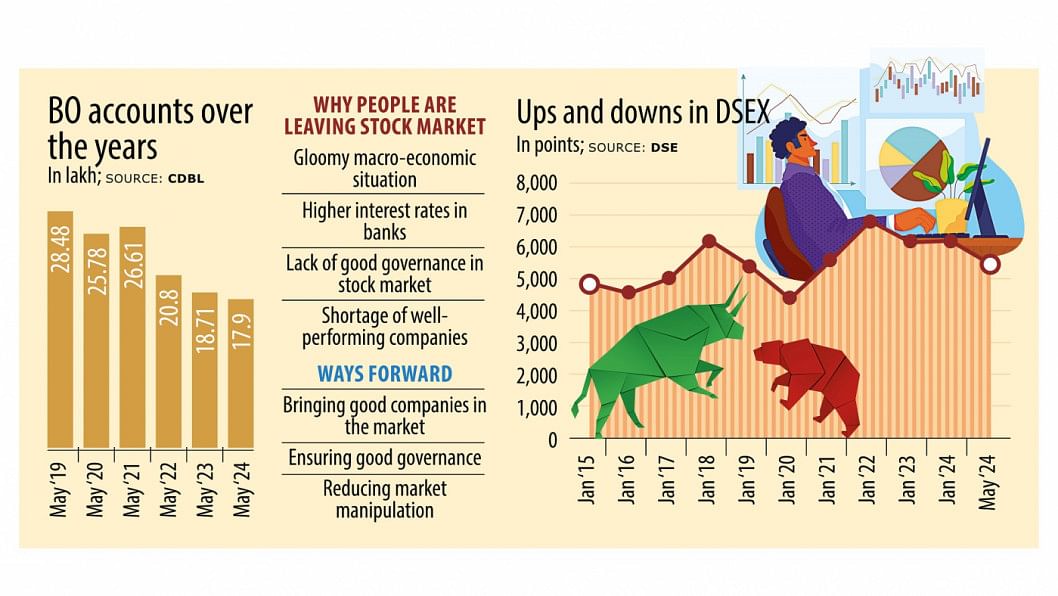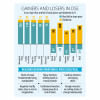Why are investors leaving the stock market?

Stock investors in Bangladesh are leaving the share market as they are losing their hard-earned money because of the persisting fall of the indices driven by the prolonged economic crisis, the worsening health of the banking industry, and rising interest and exchange rates.
The number of beneficiary owners' accounts dropped more than 4 percent to 17.90 lakh last week from a year prior, data from Central Depository Bangladesh Ltd (CDBL) showed.
A year ago, the number of BO accounts was 18.71 lakh, while it stood at 20.80 lakh in May of 2022 and 26.61 lakh in the identical month in the previous year.
Although each BO account does not necessarily refer to a stock investor, the number is still tiny in a country of 17 crore people.
The decline is mainly the result of a long absence of good governance in the market, the lack of a high number of sound companies, rapidly rising interest rates in the banking sector, and the gloomy economic outlook, said industry people.
Even worse, investments in good stocks can't ensure good returns while trading in junk stocks is giving better profits. Therefore, informed investors are exiting the market.
People's trust in the stock market is falling. Therefore, many of them are leaving and many will exit soon, they warn.
A stock market analyst, who has been in the stock market for around three decades, told The Daily Star last week that he sold off most of his stocks because he feared that the macro-economic scenario may deteriorate.
For him, there are genuine causes for concern.
The economy has long been struggling to make a comeback from the fallout of the coronavirus pandemic and the Russia-Ukraine War.
The foreign currency reserves, which had shot to an all-time high in August 2021, have halved in the past two years. The taka has lost its value by 35 percent, making imports costlier.
Owing to external and internal factors, inflation has stayed above more than 9 percent for the past 20 months, bringing in about one of the longest spells of cost-of-living crisis in recent memories in a country where the number of poor and low-income people is high.
"If the taka falls further, foreign investors will sell more shares," the trader said. "Similarly, the manufacturing sector may face difficulty in the coming months if the forex reserves don't pick up."
"This is because their raw materials cost will rise. Their profit which has been under pressure in recent quarters due to the rapid depreciation of the local currency may plummet."
Jakir Hossain, an investor, sold off his entire holding and closed his BO accounts last month.
"I lost 60 percent of my investments in the last three years. Due to the floor price, I was stuck for around two years. In early 2023, I could not even sell shares when I needed money the most."
The DSEX, the benchmark index of the Dhaka Stock Exchange, hovered around 6,200 points for around two years before the regulator began withdrawing the floor price in January. Since then, it dropped 11 percent, or 725 points, to 5,517 last week.
Investors in Bangladesh are losing their appetite for stocks at a time when markets in most other countries are displaying scintillating performance although the war in Ukraine is still raging while the Middle East is witnessing new conflicts.
For example, the Dow Jones industrial average, the index of 30 prominent companies listed on stock exchanges in the United States, closed above the 40,000-mark for the first time on Friday.
In March, Germany's benchmark blue-chip stock index topped 18,000 points for the first time despite struggles for the overall German economy.
Despite external headwinds, both the Nifty 50 and the BSE Sensex of India recorded hefty gains, making 2023 their second-best year since 2017.
Even, crisis-hit Pakistan's benchmark index traded at a record high of 71,474 points, after earlier breaching the key 71,000 level on Monday. The market has surged 74 percent over the past year, reports the Economic Times of India.
Md Saifuddin, a senior vice-president of the DSE Brokers Association, said good companies usually don't harm their investors.
"Although most of the well-performing stocks have dropped significantly, they may give a higher return in the future. Therefore, investors should hold patience."
Also the managing director and CEO of IDLC Securities, Saifuddin said the interest rate in the banking sector is rising while the high exchange rate has gone up.
"These rates have impacts on the stock market – when both rates climb, the market falls."
On May 8, the Bangladesh Bank scrapped the SMART formula to make interest rates fully market-based, less than a year after the Six-month Moving Average Rate of Treasury bills (SMART) was introduced and the 9 percent lending rate cap lifted.
Even before the formula was abolished, the maximum lending rate was 13.55 percent, much higher than the ceiling that existed for more than three years. The interest rate of treasury bills has jumped to a record high of 12 percent.
Since investors can receive higher returns, they are increasingly parking funds in banks. Even treasury investments are producing sizzling returns.
The stock market needs some components to attract people, but they are almost absent in the market, said Saifuddin.
"For example, the market should have a large number of investible stocks. But, stocks such as Grameenphone that have the capacity to pull investors have not made debut on the Dhaka Stock Exchange in the last one decade."
The listed companies should have corporate governance and trustworthiness. However, the reality in Bangladesh is their credibility is questionable, according to the senior official.
Sarwar Alam, who has been trading stocks on the DSE since the 1980s, said he has always invested in stocks of fundamentally sound companies and saw many ups and downs in the last four decades.
He left the market before the market crash in 2011, so he did not incur losses. However, he has not been that lucky during the current bearish run: his portfolio has lost value of around 40 percent in the last two years.
"This is disappointing," said Alam, who has reduced investments to a large extent as the market does not show any signs of improvement.

 For all latest news, follow The Daily Star's Google News channel.
For all latest news, follow The Daily Star's Google News channel. 








Comments